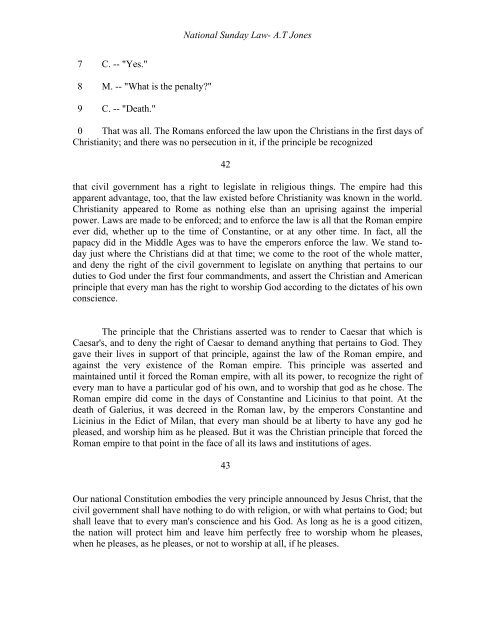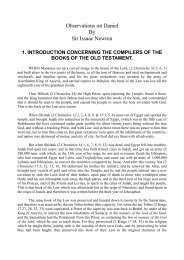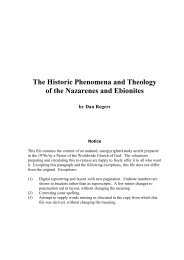THE NATIONAL SUNDAY LAW, ARGUMENT OF ALONZO T ...
THE NATIONAL SUNDAY LAW, ARGUMENT OF ALONZO T ...
THE NATIONAL SUNDAY LAW, ARGUMENT OF ALONZO T ...
You also want an ePaper? Increase the reach of your titles
YUMPU automatically turns print PDFs into web optimized ePapers that Google loves.
7 C. -- "Yes."<br />
8 M. -- "What is the penalty?"<br />
9 C. -- "Death."<br />
National Sunday Law- A.T Jones<br />
0 That was all. The Romans enforced the law upon the Christians in the first days of<br />
Christianity; and there was no persecution in it, if the principle be recognized<br />
42<br />
that civil government has a right to legislate in religious things. The empire had this<br />
apparent advantage, too, that the law existed before Christianity was known in the world.<br />
Christianity appeared to Rome as nothing else than an uprising against the imperial<br />
power. Laws are made to be enforced; and to enforce the law is all that the Roman empire<br />
ever did, whether up to the time of Constantine, or at any other time. In fact, all the<br />
papacy did in the Middle Ages was to have the emperors enforce the law. We stand today<br />
just where the Christians did at that time; we come to the root of the whole matter,<br />
and deny the right of the civil government to legislate on anything that pertains to our<br />
duties to God under the first four commandments, and assert the Christian and American<br />
principle that every man has the right to worship God according to the dictates of his own<br />
conscience.<br />
The principle that the Christians asserted was to render to Caesar that which is<br />
Caesar's, and to deny the right of Caesar to demand anything that pertains to God. They<br />
gave their lives in support of that principle, against the law of the Roman empire, and<br />
against the very existence of the Roman empire. This principle was asserted and<br />
maintained until it forced the Roman empire, with all its power, to recognize the right of<br />
every man to have a particular god of his own, and to worship that god as he chose. The<br />
Roman empire did come in the days of Constantine and Licinius to that point. At the<br />
death of Galerius, it was decreed in the Roman law, by the emperors Constantine and<br />
Licinius in the Edict of Milan, that every man should be at liberty to have any god he<br />
pleased, and worship him as he pleased. But it was the Christian principle that forced the<br />
Roman empire to that point in the face of all its laws and institutions of ages.<br />
43<br />
Our national Constitution embodies the very principle announced by Jesus Christ, that the<br />
civil government shall have nothing to do with religion, or with what pertains to God; but<br />
shall leave that to every man's conscience and his God. As long as he is a good citizen,<br />
the nation will protect him and leave him perfectly free to worship whom he pleases,<br />
when he pleases, as he pleases, or not to worship at all, if he pleases.
















